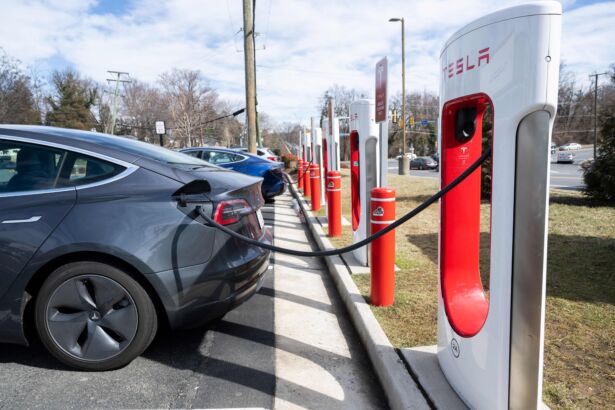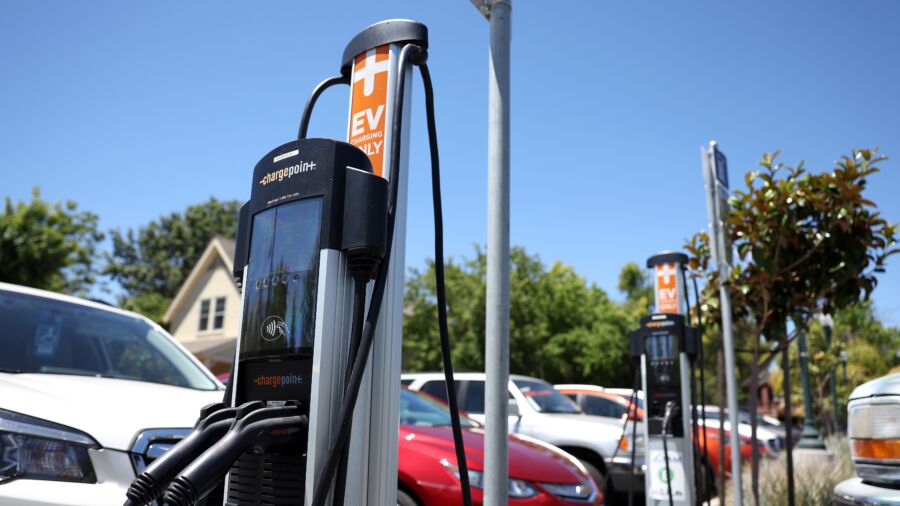Most electric cars, crossovers, and trucks cost more to charge than their gasoline-powered counterparts, according to a new study that highlights the wisdom of considering the real-world costs of operating a vehicle before making a buying decision.
Acquiring a vehicle is likely to be a person’s biggest purchase after buying a house. With a growing range of electric vehicles now part of the offering, consumers are spoiled for choice—that is until bans on gasoline-powered vehicles start going into effect in some states in coming years.
But while many advocates of electric vehicles (EV) claim operating cost affordability as an argument in favor of ditching internal combustion engine (ICE) cars and trucks, a new study from Anderson Economic Group (AEG) has hit the brakes on that argument.
It turns out that, in AEG’s analysis of vehicle fueling costs, the vast majority of gasoline-powered cars and crossovers sold in the United States cost less to fuel than their electric counterparts to charge.
“With electricity prices trending up and gas prices going down, most traditional gas-powered vehicles cost less to drive than their EV counterparts,” the consulting group wrote in the study.

More Details
While the differences vary across segments and depending on whether charging is done at home or commercially, the results are a stark reminder that going electric simply costs more to run.
For example, in the Entry segment (which includes cars like the Chevy Bolt and Honda Civic), a gasoline-powered model costs on average $9.78 per 100 miles to fuel. By contrast, the average EV in the same segment costs $12.55 to charge per 100 miles—but only if charged mostly at home. If charged mostly commercially that cost soars to $15.97 per 100 miles.
It’s the same story for the Mid segment (which includes the Chevy Malibu and the Honda Accord). An ICE car in this category costs on average $11.08 per 100 miles in gasoline, while an EV costs $12.62 for mostly home charging and $16.10 for mostly commercial.
The difference slims in the Truck segment with a gasoline-powered pickup like the GMC Sierra costing on average $17.58 per 100 miles to fuel, while an EV model costs $17.72 to charge per 100 miles—provided it’s plugged in mostly at home. Those who charge their electric pickups mostly commercially are in for a rude awakening with the cost surging to $26.38 per 100 miles.
In fact, the only segment where going electric can be cheaper is Luxury, where a high-end ICE vehicle such as a Tesla Model X costs on average of $13.50 to charge per 100 miles compared to an ICE vehicle like a BMW 5 Series, which on average costs $17.56 per hundred miles to fuel with gas. But again, that advantage in favor of EVs only holds for mostly home-based charging. The cost of charging a luxury EV climbs to $17.81 per 100 miles for mostly commercial charging, which is slightly more than for a high-end gasoline-powered vehicle.
“These results underline the importance of considering real-world costs before making a buying decision,” the consulting company said in the study. “These include knowing how often you travel away from home, your ability to install and rely upon a home charger, the costs and availability of commercial charging, and any road taxes levied on EV drivers in your state.”
The methodology used by AEG to calculate and compare ICE fueling costs versus EV charging expenses is based on a multi-variable analysis that includes gas taxes, electricity prices, and EV registration fees in the Midwest or State of Michigan, extrapolated to the rest of the country.
The findings build on an earlier January 2023 study by the same group, which found that rising energy costs and falling gasoline prices in the fourth quarter of 2022 put the cost of charging EVs higher than the cost of fueling gas-powered vehicles for the first time in 18 months.
Charging Network
One factor often cited by experts as a hurdle to the wider adoption of EVs is the lack of charging infrastructure.
There are currently just under 8,700 direct-current fast-charging stations in the United States and Canada with nearly 36,000 charging plugs, according to the U.S. Department of Energy (DOE).
The National Renewable Energy Laboratory estimates that 182,000 fast chargers will be needed by 2030 amid the government’s push to adopt net-zero emission goals and other policies meant to discourage fossil fuels.
In a bid to expand the charging network and make EVs more accessible to consumers, seven major automakers recently announced they are forming a joint venture to build a large EV charging network in North America.
The group includes General Motors, BMW, Honda, Hyundai, Kia, Mercedes, and Stellantis.
The companies said they will install at least 30,000 high-powered charging stations in major cities and highway locations by 2030. The first stations will be ready by next summer in the United States and in Canada at a later stage, the companies announced.
Part of the rationale for the move is to allay consumer fears that chargers won’t be available for long-distance travel.
Vehicles made by other manufacturers, not just these seven, will also be able to charge at these stations. It will have connectors for both Tesla’s North American Charging Standard plugs as well as the Combined Charging System plugs used by other automakers.
The new joint venture will rely on funds from the automakers as well as using grants offered by the federal government to help pay for the network.
The automakers did not disclose the financial details of the venture but said they would be open to additional investment or participation from other companies, including outside the auto industry.
In the United States, electric vehicle sales continued to rise during the first half of the year to more than 557,000 vehicles, or 7.2 percent of all new vehicle sales. Industry analysts predict continued growth in EV sales for the next decade or more.
Jane Nguyen and The Associated Press contributed to this report.
From The Epoch Times


